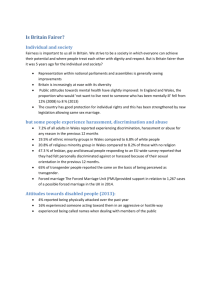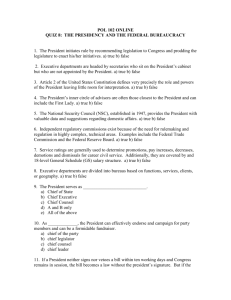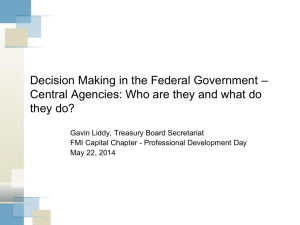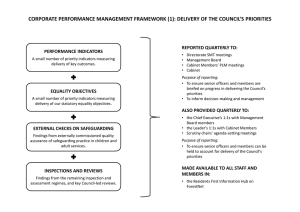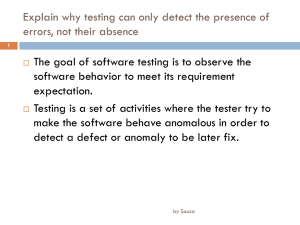What would Thomas More do
advertisement
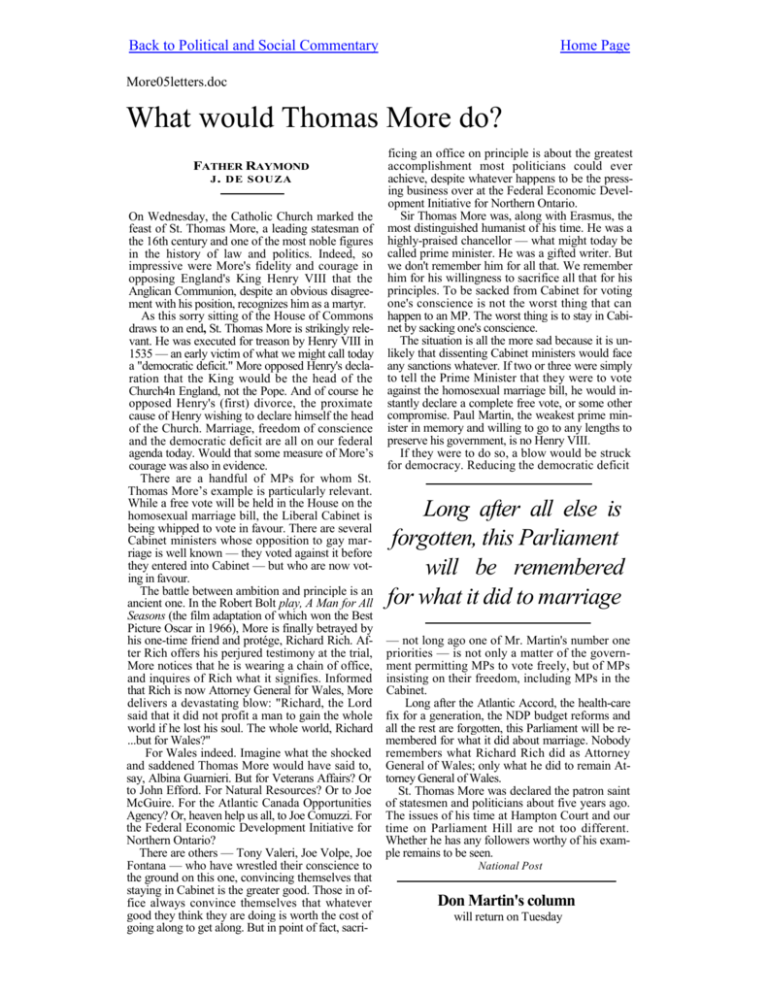
Back to Political and Social Commentary Home Page More05letters.doc What would Thomas More do? FATHER RAYMOND J . DE SOUZA On Wednesday, the Catholic Church marked the feast of St. Thomas More, a leading statesman of the 16th century and one of the most noble figures in the history of law and politics. Indeed, so impressive were More's fidelity and courage in opposing England's King Henry VIII that the Anglican Communion, despite an obvious disagreement with his position, recognizes him as a martyr. As this sorry sitting of the House of Commons draws to an end, St. Thomas More is strikingly relevant. He was executed for treason by Henry VIII in 1535 — an early victim of what we might call today a "democratic deficit." More opposed Henry's declaration that the King would be the head of the Church4n England, not the Pope. And of course he opposed Henry's (first) divorce, the proximate cause of Henry wishing to declare himself the head of the Church. Marriage, freedom of conscience and the democratic deficit are all on our federal agenda today. Would that some measure of More’s courage was also in evidence. There are a handful of MPs for whom St. Thomas More’s example is particularly relevant. While a free vote will be held in the House on the homosexual marriage bill, the Liberal Cabinet is being whipped to vote in favour. There are several Cabinet ministers whose opposition to gay marriage is well known — they voted against it before they entered into Cabinet — but who are now voting in favour. The battle between ambition and principle is an ancient one. In the Robert Bolt play, A Man for All Seasons (the film adaptation of which won the Best Picture Oscar in 1966), More is finally betrayed by his one-time friend and protége, Richard Rich. After Rich offers his perjured testimony at the trial, More notices that he is wearing a chain of office, and inquires of Rich what it signifies. Informed that Rich is now Attorney General for Wales, More delivers a devastating blow: "Richard, the Lord said that it did not profit a man to gain the whole world if he lost his soul. The whole world, Richard ...but for Wales?" For Wales indeed. Imagine what the shocked and saddened Thomas More would have said to, say, Albina Guarnieri. But for Veterans Affairs? Or to John Efford. For Natural Resources? Or to Joe McGuire. For the Atlantic Canada Opportunities Agency? Or, heaven help us all, to Joe Comuzzi. For the Federal Economic Development Initiative for Northern Ontario? There are others — Tony Valeri, Joe Volpe, Joe Fontana — who have wrestled their conscience to the ground on this one, convincing themselves that staying in Cabinet is the greater good. Those in office always convince themselves that whatever good they think they are doing is worth the cost of going along to get along. But in point of fact, sacri- ficing an office on principle is about the greatest accomplishment most politicians could ever achieve, despite whatever happens to be the pressing business over at the Federal Economic Development Initiative for Northern Ontario. Sir Thomas More was, along with Erasmus, the most distinguished humanist of his time. He was a highly-praised chancellor — what might today be called prime minister. He was a gifted writer. But we don't remember him for all that. We remember him for his willingness to sacrifice all that for his principles. To be sacked from Cabinet for voting one's conscience is not the worst thing that can happen to an MP. The worst thing is to stay in Cabinet by sacking one's conscience. The situation is all the more sad because it is unlikely that dissenting Cabinet ministers would face any sanctions whatever. If two or three were simply to tell the Prime Minister that they were to vote against the homosexual marriage bill, he would instantly declare a complete free vote, or some other compromise. Paul Martin, the weakest prime minister in memory and willing to go to any lengths to preserve his government, is no Henry VIII. If they were to do so, a blow would be struck for democracy. Reducing the democratic deficit Long after all else is forgotten, this Parliament will be remembered for what it did to marriage — not long ago one of Mr. Martin's number one priorities — is not only a matter of the government permitting MPs to vote freely, but of MPs insisting on their freedom, including MPs in the Cabinet. Long after the Atlantic Accord, the health-care fix for a generation, the NDP budget reforms and all the rest are forgotten, this Parliament will be remembered for what it did about marriage. Nobody remembers what Richard Rich did as Attorney General of Wales; only what he did to remain Attorney General of Wales. St. Thomas More was declared the patron saint of statesmen and politicians about five years ago. The issues of his time at Hampton Court and our time on Parliament Hill are not too different. Whether he has any followers worthy of his example remains to be seen. National Post Don Martin's column will return on Tuesday National Post June 24 letter If Thomas More were alive today … Re: What Would Thomas More Do?, Father Raymond de Souza, June 23. Father Raymond de Souza suggests that the intensity of Thomas More’s religious beliefs should be relevant today. I respectfully disagree, particularly when one considers the state of religion and politics during More’s life. It should be remembered that religious fervour was utilized to ethnically cleanse Jews from Spain during the Spanish Inquisition that started in 1478 and officially ended in 1808. This should give pause to Father de Souza, who should consider the current state of religion before he urges Catholic members of Parliament to burn their careers for Catholic religious principles. I am sure that there are many Catholics who oppose the Church’s birth control policies and who accept abortion and gay marriage. This does not make them bad people. While traditionalists like father de Souza yearn for the good old days, I suggest that pragmatism amongst our parliamentarians and the people they govern is a positive sign. Larry Shapiro, Calgary. National Post Jun 25 letters Thomas More’s lesson for parliamentarians Re: What Would Thomas More Do?, Raymond de Souza, June 22. Father de Souza is to be congratulated for an excellent column, questioning how Catholic Cabinet ministers could, in good conscience, support the same-sex marriage bill. Perhaps the ministers named could be provided with a copy of this column, and be reminded each morning when they look in the mirror: How can I justify my actions? Eric Smith, Grimsby, Ont. This is a column for all seasons, and will be relevant as long as the principled confront the self-serving. Christine and John Furedy, Toronto. Father de Souza’s analogy of St. Thomas More’s epic battle with King Henry VIII, which cost More his life, is an appropriate one to describe London Fanshawe MP Pat O’Brien’s battle with his own party to oppose Bill C-38. Mr. O’Brien is a political hero and a shining example to all MPs as he follows his conscience on this very divisive issue. I hope there will be more Pat O’Brien’s to emerge from the Liberal caucus. Frank Ruffolo, Toronto.


